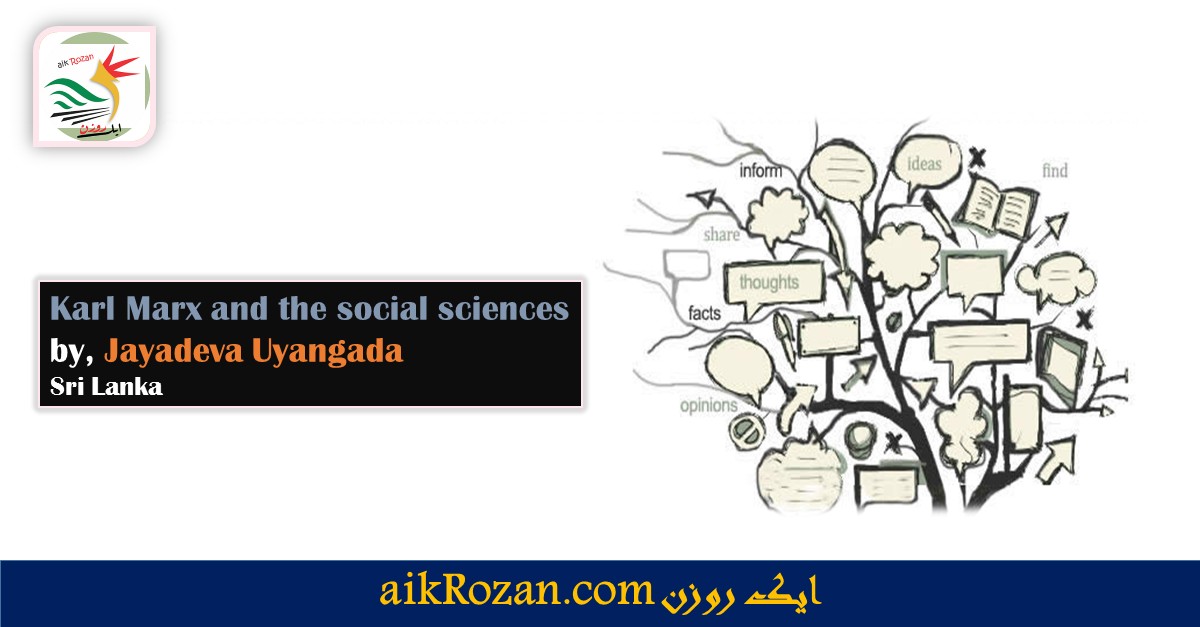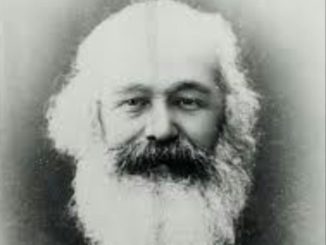
Karl Marx and the social sciences
by, Jayadeva Uyangada
In this bicentennial year of Karl Marx’s birth, there has been a great deal of celebration of his work and ideas. Many essays that appeared in the global media during the first week of this month –Marx was born on May 5, 1818 – emphasized the relevance of his critique of capitalism even today. The sharpening world crisis, which we have been witnessing for some time now, has been precipitated by economic globalisation. Globalisation and neo-liberal reforms have pushed the world into an unprecedented degree of uncertainty at the social, political, moral and existential levels. Some commentators see signs of the return of ‘an age of anger’ with unpredictable consequences.
It is against such a dystopian backdrop that many commentators in the West as well as the non-West have begun to return to Marx’s work to find intellectual tools to simply come to grips with what is happening in the world and where it is heading. One point that even Marx’s critics agree is that no other thinker, before or after him, had examined and analysed capitalism, its dynamics and destructive consequences so sharply and penetratingly as Marx did. Tributes and backhanded compliments that have been paid two weeks ago to the old master even in the bourgeois press in London, which pilloried him during the second half of the 19th century, tell us that it is time for us also to re-read at least Volume I of Das Kapital.
This essay attempts to outline another important contribution that Marx made to expand the horizons of human knowledge about the world – social science methodology and theory.
Backdrop
Marx had an extremely active intellectual life for about 40 years, starting from the early 1840s and ending in 1884. Poverty, exile and ill health did not prevent him from reading and writing on an amazingly regular basis. He read volumes and volumes of books, newspapers and periodicals and wrote, mostly in German, on themes, in a range of fields – philosophy, economics, politics, history, social change, social theory and of course, capitalism, working class struggles, revolution, and socialism. He was a newspaper columnist too.
The period of five decades that covered Marx’s intellectual life was also the period during which one of the most important developments of human knowledge occurred in Europe, that is, the birth of modern social sciences. A contemporary French thinker and philosopher, August Comte, who was 20 years senior to Marx, inaugurated this ‘scientific turn’ of the study of human society. Comte wrote his famous The Course in Positive Philosophy during 1830 and 1842 as a series of small texts. It is Comte’s The Course that laid the foundations and arguments for a new ‘science of society.’ His aim was to establish a new discipline, the mandate of which was to produce reliable and true knowledge about society, that can be used for social engineering and reforms in the crisis ridden post – Revolutionary France. The 1840s were the formative years of Marx’s intellectual life.
May also be of interest: Frankfurt School diagnosed the ills of Western civilisation
Comte’s key epistemological argument, which came to be quickly shared by a host of German and French thinkers, ran as follows: It is only when social thinkers produce reliable knowledge that their ideas can be meaningfully used to design social policy. The enlightenment tradition of critique and philosophising produced only speculative and dubious knowledge about society that could hardly guide social reforms and state policy. If social thinkers were to produce useful knowledge, they should adopt an entirely new methodological approach in order to see society as it is. Comte saw such an approach already being employed in the fields of physics, astronomy and other natural sciences.
Comte believed that by adopting the same methodological approach, which had been so effectively used in the natural sciences to produce major breakthroughs in knowledge, the study of human society could also become a ‘science’, fundamentally different from philosophical speculation. In fact, Comte proposed a new system of social knowledge, calling it ‘sociology,’ meaning, ‘the science of society.’ It was to be based on a new methodology. He called the latter ‘positive philosophy’ or ‘positivism.’ Comte’s positivist method was the application of the empiricist method of the natural sciences in the study of human society. This is how modern positivist social sciences originated.
Marx’s search
The 1840s was also the time when Marx as a young doctoral degree holder in Philosophy in Germany, had begun a hugely ambitious search for an entirely new philosophy, social theory and methodology to understand the world and of course to change it. Marx’s writings do not indicate that he was part of the intellectual groups of academic philosophers and social thinkers who were influenced by Comte’s work. Rather, his sources of inspiration were initially Hegel, and then radical social activists and working class leaders. The latter were also trying to propose a different project of social engineering, that is, radical social reforms that would benefit the victims and left-outs of Europe’s raging industrial capitalism and its prosperity for the few. But Marx went beyond the project of social reform and invented the goal of social transformation and replacement of capitalism by socialism through revolution.
Interestingly, Marx defined, conceptualised and articulated his own intellectual project, with its strong radical orientation, within the traditions of European philosophy and science. As his writings of the 1840s indicate, he spent his entire youth, to study, critique and, as Luis Althusser has shown in For Marx and Reading Capital, to settle accounts with the dominant tradition of European philosophy and social thought. Kant and Hegel had been the major figures in the modern European philosophy, which Marx critiqued as a philosophy of idealism. One of Marx’s goals during his youth was to discover philosophical foundations for a new paradigm of social inquiry.
Marx’s critique of contemporary European philosophy and social thought had a number of elements. One of its key aspects is that he was looking for an alternative paradigm of ‘knowing the world’, or a new epistemology. Epistemology is that branch of philosophy, which deals with questions about the means, ends and justifications of human knowledge about the natural and social world. Since Francis Bacon of the 17th century, epistemology had acquired another dimension of meaning – methodology and methods of gaining knowledge. As a mid – nineteenth century philosopher-cum-social thinker, Marx was also looking for a new ‘science of society’ that differed from philosophical metaphysics, enlightenment rationalism as well as idealist epistemologies.
Historical materialism
This is where the question of science and ‘scientific method’ entered Marx’s thought as well. As much as Comte and his disciples were keen to produce a new social science, Marx also was busy with exploring the possibilities of a new social science during the 1840s and early1850s. As adulatory writings on Marx by Engels, Marx’s co-thinker, and Lenin and Trotsky, Marx’s eminent disciples, show, Marx thought of himself as the founder of a new ‘science.’ In fact, Engels thought that Marx’s theory of historical materialism was as important a scientific discovery as was Darwin’s theory of evolution. Both, according to Engels, were epoch making discoveries that revolutionised the human understanding of the natural and social worlds.
Now, as a self conscious ‘scientist’ of society, Marx had to tread a particular path of discovery available within the European traditions of philosophy and science. Realising that the ‘idealist’ tradition of the philosophical mainstream was of no help to construct methodological tools to understand the social ‘reality,’ Marx turned to a minor tradition, which he called the ‘materialist philosophy’ of the ancient Greeks and post-medieval philosophers. That is how Marx came to appreciate ‘English empiricism’ the founding philosopher of which was Francis Bacon. It was Bacon’s book, Novum Organum (‘New Instrument’), originally published in Latin in 1620, which laid the epistemological foundations for the modern natural and social sciences. The way in which Marx settled accounts with English empiricism warrants at least a brief discussion at this point.
Rationalism and syllogism
Before that, a brief explanation of why Francis Bacon is relevant to our discussion on Marx and the social science methodology is warranted. It was Bacon who in his Novum Organum and other writings invented the philosophical system, and also the myth, about the ‘scientific method’ which provided the epistemological and methodological scheme for modern natural and social sciences. In the classical and medieval Europe, there were two dominant epistemological traditions and both were varieties of metaphysics. In constructing his new scheme, Bacon thoroughly rejected both these pre-existing traditions.
The first was the Aristotelian tradition of rationalism and syllogism. Its key epistemological position was that the authentic means to producing correct knowledge was the existing knowledge claims and propositions already developed by philosophers by means of deductive reasoning. Christianity and the Church provided the other path of knowledge. According to this theological epistemology, the faith in the divine revelation, divine prophecy and their infallibility were the sole means to justify and accept knowledge claims about the world.
By this time, as Edgar Zilsel, an émigré Marxist historian of scientific thought of Austrian origin, living in exile in New York, showed during the 1940s, there was an alternative tradition of knowledge production in practice among artisans, technicians and scientific workers. It was the method of experimentation.
Artisans and technicians, say when building chariots, furniture, and even roads and bridges, found divine revelation and scholastic dogmas of no use in the production of their professional, technical knowledge. Experiment, trial and error, and observation — in other words, ‘experience’ – constituted their method of producing knowledge. It was this method that professional scientists in European academies improved on and effectively employed to make astounding scientific discoveries in physics and astronomy.
For justifiable reasons, it was this method of scientific knowledge production by means of experimentation and experience, as opposed to metaphysics of both, the Christian theological and Aristotelian scholastic traditions, that came to be known in European philosophy of science as the Galilean model of scientific reasoning, named after famous Galileo.
Empiricist Method
Now, what Bacon did in two influential texts, Novum Organum and Advancement of Learning, was the systematisation, within a framework of philosophy, of this experience – based approach to the production of scientific knowledge. Bacon delivered a scathing attack on the Scholastic and Theological metaphysics, accusing them of producing ‘false knowledge.’ By doing so, Bacon also laid out a scheme for an experience-based procedure for the production of scientific knowledge. It is this scheme that later came to be known as the scientific method in natural and social sciences, which even today Sri Lanka’s A/L students mechanically learn in their Logic class, without any instructions on its historical and philosophical background. It is also known as the ‘empiricist method.’ ‘Empiricist’ or ‘empirical’ means ‘based on sensory experience.’ Experience in the philosophy of science means experimentation and observation.
It was this Galilean – Baconian method that had been employed by the natural scientists which Comte proposed for the study of human society as the most authentic means to producing reliable knowledge on society. And Bacon was the inaugurator of English empiricist philosophy, which was later followed, developed, and refined by philosophers such as Thomas Hobbes, David Hume and John Stuart Mill. It was this tradition of science and epistemology that was becoming an intellectual fashion among social thinkers in Europe during the 1840s and 1850s. And obviously, Marx had to deal with it too.
Marx’s Critique
Why did Marx have to deal with the empiricist tradition so seriously? Because, it had contributed to epoch making advancements in the understanding of the natural world and therefore, the argument that the natural science method was the natural path to knowledge about human society, was too formidable to resist. But the goal of Marx’s intellectual project was radically different from his contemporary philosophers and thinkers. As he formulated it in his famous Eleventh Thesis on Feuerbach, ‘philosophers had only described the world; the task now is about how to change it.’
The kind of philosophy, epistemology ad social theory that Marx was looking for had to be one that enabled the seeker of knowledge to see beyond the appearance by penetrating through the veil of religion, ideologies, myths, false beliefs and metaphysics. It had to be a science in the sense that it was critical knowledge about the world, not superficially empirical observations that helps the seeker to grasp the ‘social reality’ and also provide intellectual capacity and guidance to change the world. In other words, to be truly scientific, social inquiry should be praxis-based and praxis-oriented, not simply empiricist.
As a ‘scientist’ in the European tradition of science and enlightenment, Marx also sought to discover ‘universal laws’ about the social world and human history. In this sense, he was also partly Hegelian, although he abandoned the idealism and philosophical mysticism of Hegel, who was his philosophical hero during his youth when studying at the university.
Actually, Marx considered his theory of historical materialism a universal law that could explain the dynamics of human society and history, independent of time and space. It also sought to map out a common path of progress for the entire human society. Here, Marx and Engels were more in the tradition of European enlightenment thought than empiricism and positivism of Comte. No wonder that ex-Marxist post-modernists attacked Marx severely, a few decades ago.
There is a brief, yet insightful, discussion in The Holly Family (1845) jointly written by Marx and Engels on the limits of Bacon’s legacy of English empiricism and materialism. While identifying themselves with the materialist tradition of European philosophy, Marx and Engels showed a great deal of respect for English materialism that Bacon inaugurated. However, they were also quick to highlight the philosophical limitations of Bacon and English materialism. They dismissed the English materialism of Bacon and Hobbes for its theological confusions, idealist pitfalls and mathematical abstractions devoid of any real relevance to understanding of human society in its concrete terms.
Now, Marx as a philosopher and social theorist was more of a materialist than an empiricist. That is why he could stay away from the empiricist and positivist schools of social sciences that began to develop in Europe after the 1850s. In the hands of the Austrian School of Economics, and Emile Durkheim and positivist sociologists, positivism became the new epistemology and methodology of the new science of human society. It introduced the scientific method, as first philosophized by Bacon in the 17th century and later refined by Hume and Mill, as the only reliable and authentic method of social science knowledge production.
A major reaction to this scientization of social knowledge came from European humanists in the form of phenomenology and hermeneutics. Marx and Marxists were never excited by these idealist revolts against empiricist reductionism in the social and human sciences. As we noted above, Marx was never an empiricist in his philosophy and social theory; rather, he was a materialist. Thus, Marx was the founder of a non-Empiricist social science methodology and social theory, which was to develop in the twentieth century as the most radical branch of post-positivist social sciences. It remains an influential paradigm in social science research and knowledge production even today, despite occasional distractors.
Four key assumptions of the alternative social science methodology that Marx inaugurated can be summarized as follows:
· Social Sciences are a science not in the narrow sense of empiricism. They are a science because they seek to understand human society by grasping the fundamentals of ‘social reality’ beyond appearance and through inquiry, critique and theorizing, with a commitment to human emancipation. Thus, normative ends and commitments should guide social inquiry.
· Empiricism’s and positivism’s claims to scientificity of social knowledge rest on the assumption of detached observation of individual behaviour of human beings by the knower. Marx in contrast suggested that this was too narrow an approach to understand society. He proposed the need to study the practice of social collectivities – or classes – and structures as the real object of social inquiry, providing a stronger basis for scientificity of social knowledge.
· For Marx, social inquiry is not a narrowly empiricist science that merely describes the world, and reproduces the mere appearance of the world through scientized abstraction. They should aim at understanding the social totality and its concrete instances.
· Scientific objectivity in social inquiry should not be treated as value-free. There is no value-free science in the study of human society.
It is this ‘social epistemology’ of Marx that provided philosophical and methodological inspiration for most of the radical social science and humanities traditions in the 20th century throughout the world. It is also this legacy of Marx that we can see reviving itself in the contemporary intellectual efforts to make sense of what is happening to the human world under conditions of economic globalization, and the wild expansion of capital under neo-liberal reforms at global level.
from the sundayobserver.lk




